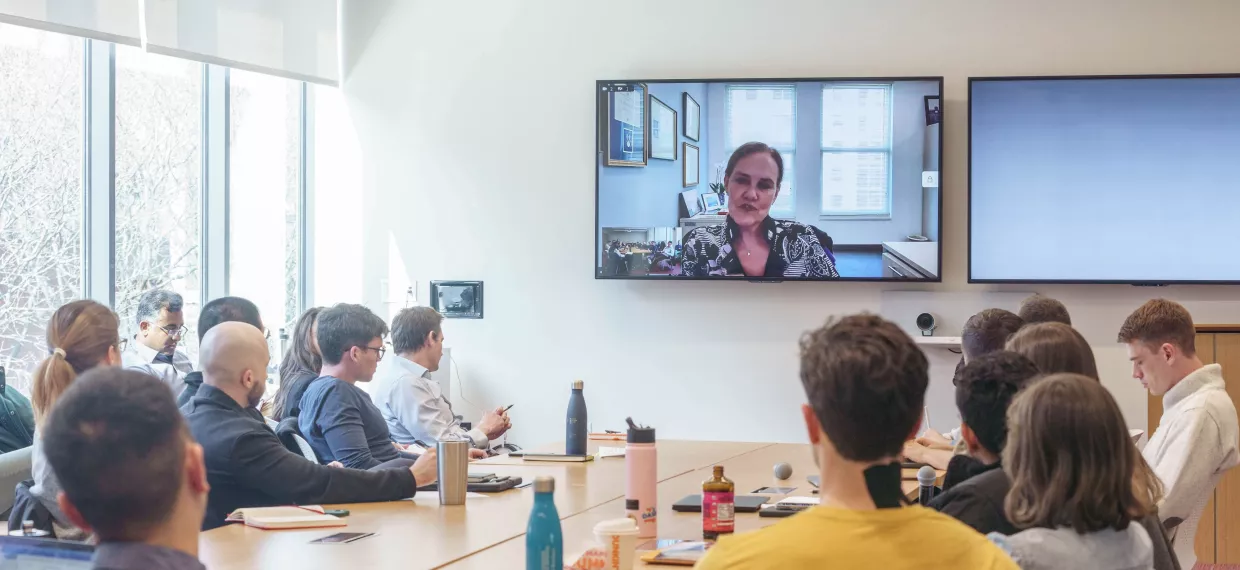
Five Key Takeaways on Defense Innovation

The Technology and Public Purpose Project recently hosted a study group on defense innovation. Led by TAPP fellow and Adjunct Lecturer in Public Policy Nick Sinai, this was the first such study group to be hosted at the Harvard Kennedy School. The group featured three sessions with Michèle Flournoy, former Undersecretary of Defense for Policy, Josh Lospinoso, co-founder and CEO of Shift5, and General Joe Dunford (ret.), former Chairman of the Joint Chiefs of Staff. Over 50 students and national security fellows attended the study group, and the discussions covered a wide range of topics at the intersection of national security, technology, and commercial innovation.
Across these sessions, five key themes emerged.
- New investments in commercial technology are critical for deterring China. China is outpacing the U.S. in capabilities like drones, hypersonics, and 5G. In the race to out-innovate and better deter China, the United States must bridge the gap between the Defense Department and commercial industry. Under Secretary for Research and Engineering Heidi Shyu has outlined 14 key technology areas for national defense; the commercial sector leads in 11 of these.
- The Pentagon needs an improved model for commercial technology acquisition. The DoD’s current acquisition model was designed for 20th-century threats and is best suited for large weapons platforms (ships, tanks, planes, etc.) that aren’t rapidly evolving. One possible solution is to introduce a capability portfolio model, which would guide investments by a capability need across programs, rather than by rigid program requirements that prevent scaling innovative technology widely in the DoD. Establishing a capability portfolio model was also a recommendation in the recent interim report from the Atlantic Council’s Commission on Defense Innovation Adoption. However, reforming defense acquisition will be unsuccessful unless Congress changes how it oversees programs. The DoD must also improve its training for contracting officers and acquisition officials, so that they can better leverage new authorities to scale emerging technologies.
- Congress has a critical role to play in technology innovation and investments. The U.S. Congress sets the policy and funding context for the Defense Department, and can support defense innovation adoption with legislation and appropriations. Congress has taken promising steps to do so by increasing the Defense Innovation Unit's budget and directing the Pentagon to evaluate the risk of autonomous drone swarming threats in the FY2023 NDAA. However, Congress can do more. For instance, it should expand critical initiatives, like National Security Innovation Capital, to support early-stage hardware companies that have innovative solutions for the Department.
- The U.S. needs to leverage its allies. As strategic competition ramps up between the United States and China, the U.S. needs to leverage its largest competitive advantage: its global network of alliances. Efforts like AUKUS’ technology transfer projects and NATO’s project DIANA can help the U.S. drive innovation while countering China’s investments and growing influence.
- Take lessons from Ukraine’s innovative response to Russia's Invasion. The Ukrainians have found innovative ways to use commercial technology, like drones, space-based capabilities, and AI, to outmaneuver Russian forces. The creative use of commercial technology on the battlefield should push the Pentagon towards increasing the rate of exercises and innovation in the field – opening its mind to the idea of continuously trying innovative capabilities, and, where there is strong product-market fit for the warfighter, scaling quickly to meet the need.
These themes were further discussed at the National Security and Innovation Conference, hosted by Harvard and MIT, and in a newly released Atlantic Commission Report on Defense Innovation, which the Honorable Michèle Flourney and TAPP Fellow Nick Sinai participated in.
Sinai, Nick , Bethan Saunders and John Schultz. “EVENT DEBRIEF: Scaling Innovation for National Security.” May 8, 2023






